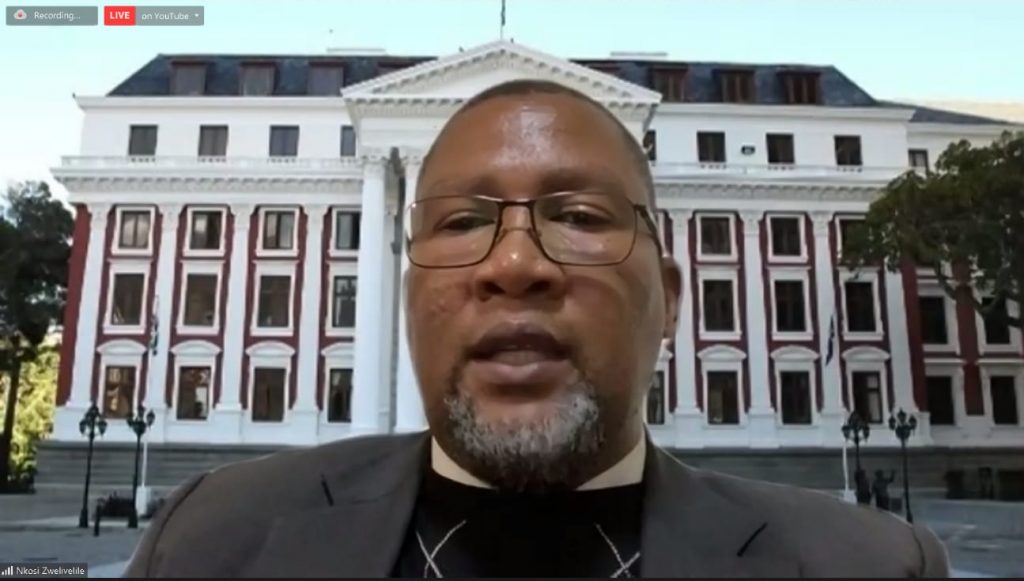15 June 2021

Nkosi Zwelivelile Mandlesizwe Dalibhunga Mandela is chief of the Mvezo Traditional Council, Member of the South African parliament and the grandson of former president Nelson Mandela.
Nkosi Zwelivelile addressed the Palestine Information Network (PIN) virtual launch of the book Masjid al-Aqsa: A Journey Through Time on June 15, 2021.
Below are a transcript of his remarks in full.
Programme Director
Moulana Aboo Baker Mahomed
Hafez Ebrahim Moosa
Fellow guests
Elders, scholars, brothers and sisters
Comrades and friends;
Assalaamu alaykum wa rahmatullahi wa barakatuhu. We thank The Almighty Allah for the opportunity to be with you. Let me start with the opening lines of a poem called “In Jerusalem” by the celebrated Palestinian poet Mahmoud Darwish:
“In Jerusalem, and I mean within the ancient walls,
I walk from one epoch to another without a memory to guide me…”
I leave those lines for you to reflect on and think of the launch of this book in that context.
Allow me at the outset to thank the Palestine Information Network (PIN) for the sterling work it does in keeping alive the powerful tradition of educating people, raising awareness and building knowledge networks and circles of influence in order to advance the Palestinian struggle.
Allow me also to thank Hafez Ebrahim Moosa for his sterling contribution through this publication “Masjidul Aqsa: A journey through time.” It is valuable contribution that will for many generations be a memory to guide us. It comes at a time when knowledge is paramount and the difference between victory and defeat, success and failure is our ability to access knowledge, leverage information and build powerful networks of consciousness; and networks of international human solidarity.
The cultural revolution and the battle of ideas played an intrinsic role in our own liberation struggle. It enabled our voices to be heard in spaces that would ordinarily be difficult to penetrate or to keep our people informed and to raise awareness. Radio Freedom, Umrabulo, Sechaba, Grassroots, Muslim Views and Al Qalam became institutions and instruments of our struggle that were so effective that they were banned for many years by the Apartheid State.
Your contribution through this webinar and the publication is of special significance as it is a timely response to Trump’s unilateral declaration of Jerusalem as the Capital of Apartheid Israel and the basic thesis that it asserts. It is also of significance in the light of the current thrust of ethnic cleansing of Jerusalem as seen in the recent and ongoing popular struggles of Sheikh Jarrah, Silwan and countless other neighbourhoods in East Jerusalem and all of occupied Palestine.
This reality of occupation and ethnic cleansing has not and will not change with the changing of successive Apartheid Israel regimes. The defeat of Bibi Netanyahu is just a change in the actors but not the script of Apartheid Israel’s occupation. This is the only goal we are interested in; ending the occupation and finding a just, fair and long term solution in order to realise the words of President Nelson Rolihlahla Mandela during his visit to Gaza in 1995: “our freedom is yet incomplete without the freedom of the Palestinian people.”
Comrades and friends;
We find ourselves at such a difficult juncture in human history. We are living through a time of immense challenges. Human suffering in the world is at unprecedented levels.
On the one hand we are dealing with a global pandemic of mega proportions and on the other we face the reality of war, violence and crimes against humanity in Palestine, Yemen, Syria, Myanmar and Kashmir. We must as a collective of global human solidarity forge greater ties of resistance, solidarity and cooperation.
The calamity an-Nakba in Palestine has now been violently foisted on the Palestinian people for more than seven decades and yet shows no sign of abating. The primary reason for this is none other than the fact that it is in reality an extension of the project of global imperialism and the occupation of Palestine serves both the interests of western imperialism as well as the agenda of successive racist Zionist regimes.
This is not a conclusion that I have come to from hearsay. I visited occupied Palestine in November 2017 and my experience affirmed what many others before me have experienced.
On his visit to occupied Palestine on the 10th March 2014 Archbishop Desmond Tutu observed: “I have witnessed the systemic humiliation of Palestinian men, women and children by members of the Israeli security forces.” I not only witnessed this but experienced it first hand being held for more than 3 hours at the border crossing with Jordan.
On the way to Bethlehem I saw IDF soldiers harassing Palestinian senior citizens old enough to be their grandparents. The treatment meted out to Palestinians at crossings, checkpoints and roadblocks are inhumane and strip people of their dignity. This humiliation is a daily lived experience and was evident wherever we travelled.
My visit to the Al Aqsa Precinct was a deeply spiritual and melancholic experience. We were hosted by an association of African families who had arrived in Al Aqsa in Salahudin Ayyubi’s army. For these Africans Al Aqsa has also become home for them for centuries.
Standing by the pulpit mimbar of Syedina Omar the second khaliefa that had been damaged by a zionist arson attack reminds one of the irreligious nature of Zionism and it’s disregard for the sanctity of the sacred space. We performed salaah in both Masjidul Quds and in The Dome of the Rock and one was ever present to the sanctity of the space and it’s place at the crossroads of the Abrahamic faiths and the confluence of history.
This is but one aspect of the symbolism of Al Aqsa. One cannot miss the fact that Al Aqsa is a shared space sacred to Jews, Christians and Muslims with religious symbols of all three faiths evident everywhere. Not only have we fought together against the Zionist occupation since the inception of Apartheid Israel, today perhaps on an unprecedented scale young Jews are also starting to rise against Apartheid Israel’s atrocities. Perhaps for the first time in recent years Apartheid Israel’s propaganda machine failed and was outsmarted and outmatched by global public opinion.
My visit to occupied Palestine also took us to Shuhada Street in Al Khalil Hebron burial place of Nabi Ibrahim, Nabi Is-haaq and Nabi Yaqoob and their families. Life in this area typified the worst form of racism, inhumanity and indignity that Palestinians experience every day.
The Open Shuhada Street protests commemorates the events of 24th February 1994, when a Jewish settler from Kiryat Arba killed 29 Muslims in the Cave of the Patriarchs Massacre. This led to the periodic opening and closing of the market and surrounding streets denying people access to their homes. Some people have to access their homes by climbing over roofs and through other people’s windows. Palestinians passing through streets below are targeted by extremist Zionist settlers dumping rubbish bins and litter on them.
Every year on the 25th February activists from all over join in protests and demonstrations calling for the Open Shuhada Street in Al Khalil Hebron. I had barely set foot in Al Khalil Market when word got out of my presence and within minutes huge numbers of young and old had gathered chanting Mandela Mandela Mandela. Amidst their own doom and gloom and Apartheid Israel’s repression Palestinians remain resilient and still look to us in expectation of our support. We cannot and must not disappoint them and betray our own struggle.
I learnt so much on this trip to occupied Palestine and it underscored Madiba’s deep -rooted belief that education is the most powerful weapon which we can use to change the world. It also underscored the importance of education in the struggle for freedom. We must introduce the Palestinian struggle and other international people’s struggles in our curriculum as a matter of extreme urgency.
Comrades and friends;
I am often asked about what the priorities are for South African activism in supporting the Palestinian struggle during this phase of the Palestinian cause. My response is always prefaced by the preconditions Madiba set for entering negotiations; in the case of Palestine that would have to be:
1. An end to the occupation.
2. Right of return for all refugees.
3. Release of all political prisoners.
4. Returning homes and properties of all illegal settlements to their rightful owners
5. Invoking tribunal of International Criminal Court to charge all guilty of genocide, crimes against humanity and ethnic cleansing.
We must continue to build global solidarity with the Palestinian struggle in all forums and across all continents. We must take more firm measures to support the Boycott, Divestment and Sanctions movement in the same way that we mobilised the global Anti-Apartheid Movement against The Apartheid Regime in South Africa. It is my considered view that the BDS campaign is the strongest weapon in our hands at this stage of the Palestinian struggle. It provides us the material fulcrum around which to mobilise diverse sectors of society throughout the world.
We must continue to build on this contribution as a critical component of the cultural and knowledge revolution. We must sustain the momentum that we have built up and ensure that we tell the story of Al Aqsa and its blessed surroundings; every city and every village in occupied Palestine. As long as we tell the stories our struggle shall never die…
Let me conclude with the closing lines of Mahmoud Darwish’s “In Jerusalem”:
I am no I in ascension’s presence. But I
think to myself: Alone, the prophet Muhammad
spoke classical Arabic. “And then what?”
Then what? A woman soldier shouted:
Is that you again? Didn’t I kill you?
I said: You killed me … and I forgot, like you, to die.
Long live the struggle for a free Palestine!!
I thank you.
Nkosi Zwelivelile
Royal House of Mandela
Mvezo Komkhulu
P.O. Box 126
Viedgesville 5102
Eastern Cape Province
South Africa 🇿🇦
